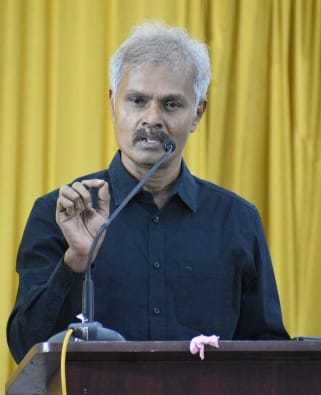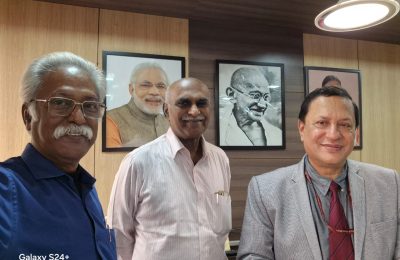
I regret that Mrs. Uma Maheswari, a graduate Teacher, working at a Government School, Nellikuppam, Chengalpattu District, has been suspended recently by the School Education Department, Government of Tamil Nadu, on the grounds of provoking fellow teachers and posting contents on social media against the State government.
In this regard, I came to understand that the School Education Department has also initiated disciplinary actions against her on 34 charges under the provisions of the Tamil Nadu Government Servants Conduct Rules 1973. The 34 charges levelled against the said teacher have been conceived by the authorities as costing violation under certain provisions of the Tamil Nadu Government Servants Conduct Rules 1973, per se, without taking cognizance on the characteristics of the actions (of the Teacher) attributed to those violations.
It appears that disciplinary action has been initiated well before exhausting the other required prior measures. If one intends to do so as the Rules say so, the said charges could easily be construed as violation if they are juxtaposed literally against the provisions of the Rules cited – 9(1), 12(1) (i) & (ii), 15, 16, 20 (1) &(2).
But the causality of the actions attributing to violation of Rules should be seen within the purview of
the primary intent of the Rules, otherwise, the Rules would not prevail upon the desirable conduct expected of the Servants. What is more important is that the question of whether the Rules intend to secure the desirable conduct expected of the servants or to simply punish them mechanically per se.
The actions of the teacher being claimed as causing those departmental charges, to the sensible mind, implicitly illustrate her good intent for the cause of the common good despite the Rules. Therefore, if the guard of the Rules had cognised the causal intent of the actor, he/she would have sensed the truth behind the actor’s action, which unfortunately would not have happened in this case.
DOES BUREAUCRACY LACK MATURITY?
The manner in which offences are being cognised by the departmental peers illustrates that the peers or the bureaucracies lack required maturity, knowledge of rules and laws, and wisdom in handling such actions that amount to violations of the laws and rules; whose disciplinary actions or decisions in such cases when put before the court of law eventually fail to prevail.
Therefore, such an approach should not be a guiding principle in taking cognizance of the so-called offences being committed on the part of the government servants. Initial measures normally precede any disciplinary action, which I doubt whether it has been followed in this case or not. But what probably would make a person in the first place to restrain from indulging in such actions, including criticism of the government policies, is that the rightness of the policy or plan itself in terms of its efficacy in rendering justice to or remedying problems facing the society.
HOW TO EXPRESS THE VIEWS?
The rightness or wrongness of a policy in a democratic setting is often adjudged by the collective consciousness of the society and all relevant stakeholders. As a stakeholder, the said Teacher would have expressed her views and opinions in the interest of achieving common good, which otherwise if proved prima facie a violation, the implicated person would surely face the disciplinary actions. But how to democratically express such views and criticism despite the Rules is a question pending to be resolved in our democracy.
But then the question arises whether the Rule prevents a key stakeholder from expressing her/his concerns and views about a public policy or scheme. If it does so then the fundamental problem lies not in the stakeholder’s expression but very much in the Rule itself.
Such Rules should be interrogated suitably to ensure that polices, plans and schemes, despite their nature being strategic and top-down, have incorporated the views of all key stakeholders before being finalised for implementation. I wonder whether this is being followed by all the governments, both union and State, in the recent decades. This is the problem haunting the country throughout the nation, and in the highly conscious Tamil Nadu state as well.
There has been a deep crisis in the governance of the present state establishment; which has put the governance of the state comprised of the executive body (the Council of Ministers), bureaucracy (IAS) assisting the executive body, and the government functional lines in a state of disarray and despair. The executive body acts per the laws and legislations of the state legislature, and accordingly lays rules, policies, plans, schemes to ensure that they are fully realised at the society. While doing so, the executive body normally seeks experts’ inputs and other stakeholders’ inputs rather than inputs from the bureaucracy alone.
IS BUREAUCRACY MAKING THE POLICIES?
The bureaucracy’s role is to simply assist the executive body and help the state in governing the affairs in the process of implementation, coordination and monitoring and so on. The present problem of the ruling establishment is that the bureaucracy seems to have replaced the executive body in taking policy decisions, making initiatives and framing rules. It is historically known through several millennia that bureaucracy virtually does not appreciate or have a glimpse of the problems, requirements and desires of the society or a common man, but the political leadership does under the democratic setting.
That is why despite the weaknesses if any of the political leadership, that leadership is the only hope for the people in a democracy to trust. By this count, we can rightfully reject the dominating role of bureaucracy in the policy making, as the bureaucracy is unfit to constructively contribute anything whatsoever to laws, polices and strategic initiatives. Neither does it have the acquired wisdom to contribute so.
But unfortunately, this is what happening now, be it on education policy, economic policy, industrial
policy, state human resource policies, and on related initiatives. But now the executive body that has got the people mandate directly from the people has been reduced to act per the advice and domination of the bureaucracy without any first-hand inputs or advice from domain related experts and eminent scholars, and others who directly have rapport with people and their problems including social leaders, activists, and professional organisations.
Consequently, despite the government’s good intent, as may be, some of the key policies and initiatives have become counterproductive because of the inherent involvement of the bureaucracy in formulating them, on which I regret whether the political leadership of the government has learnt anything or not.
To this, it is sufficed to quote, the debacle of the recent state education policy and the roll back of the controversial Factories (Amendment) Act 2023 which allowed 12 hours shifts a day. These are the litmus indicators that show the crisis in the governance of the state by the state executive body.
THERE ARE OTHERS TOO:
Therefore, the recent episode of the said teacher who has been charged of criticising the government policies, could have triggered so out of the outburst on the merit of some of the policies and initiatives taken in the education sector. It appears that she is not the one in the field raising such criticism, but there are others too. How to reconcile with it, in case if the criticism has any merit, should have been the concern of the authority in the larger interest of the society rather than penalising her.
In this connotation, if one ponders over her acts and deeds done in the context of education one will heed that what she had done, be it her writing or activism or press note, is nothing but her intent for the common good. The manner in which she had expressed her views would have become a cause of concern, but without having an established avenue in the system of governance to express, an indignant stakeholder like her would express only through the available means, so did she.
By saying this one should not construe that one should blindly endorse her views always, as the validity of her views is often justified by the collective views of the common in the society itself. If her views were wrong, they would be rejected by the scrutiny of the collective consciousness of the common. In the same manner, the opposing views would also be subjected to the validity of the common. In this manner, the society has the capacity to adjudge itself the rightness and wrongness of the views, comments, criticisms
being floated against public institutions like the government.
Therefore, before applying the rules against criticisms the government on one hand should pursue all measures to ensure if there are merits in them and attempt to engage the critics suitably within the available avenues, and on the other should ascertain the situation with right policy decisions and interventions suitably.
Rather, the government should not put itself in a vulnerable condition that would attract public dissent. What the country, India, needs from the ruling leadership of the state is to save India and its people from fascism and anti-people laws, legislations, and policies perpetrated by the ruling BJP establishment at the centre, and ensure the same in Tamil Nadu. Democracy’s job is to ensure unobstructed freedom of expression and the due rights of all stakeholders of the democracy including the people, governments, government agencies and social institutions, but it is very much at stake now by the ruling establishment at the centre.
REVOKE SUSPENSION, APPEAL TO CM:
The people of Tamil Nadu are awaiting to see that democracy is restored in the nation and they have put much faith in the State leadership in securing the same.
Therefore, I urge the Honourable Chief Minister to take suitable interventions to ensure that the suspension of Mrs. Uma Maheswari is revoked and disciplinary actions against her be dropped. Simultaneously, the onus is only on the Honourable Chief Minister as well to ensure that the bureaucracy is deployed appropriately in the governance of the state, as too much reliance on it for policy matters would only put the government far from the people. In ensuring this, the people of Tamil Nadu would show solidarity and surely stand with the Government.
(By Prof.L.Jawahar Nesan, Former Vice-Chancellor)






